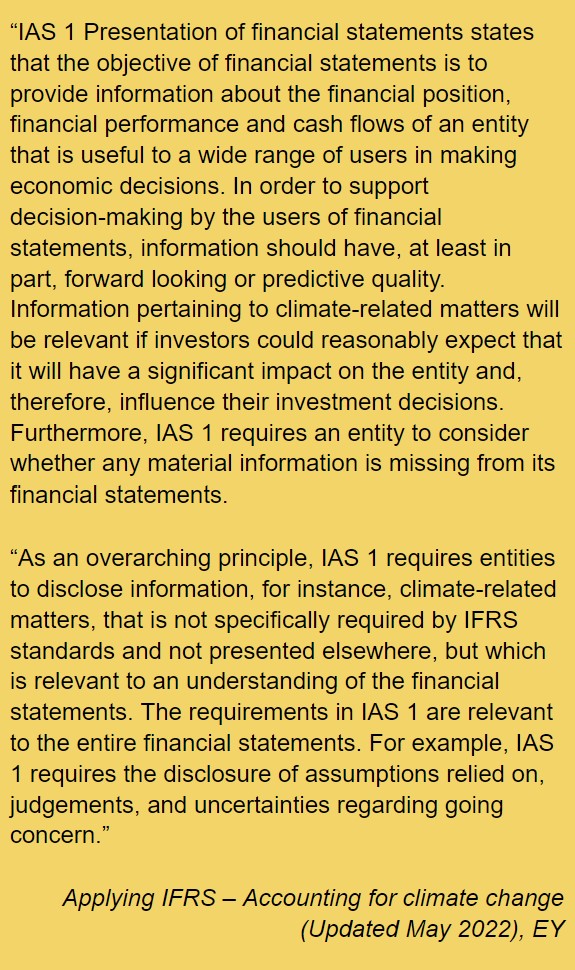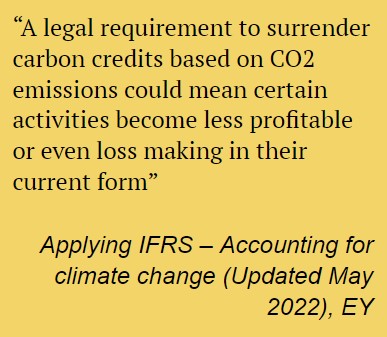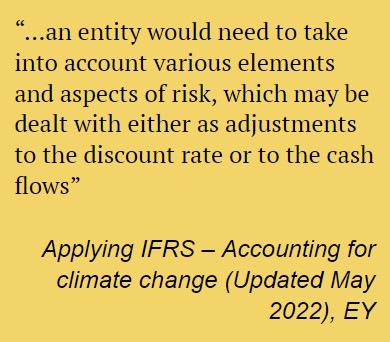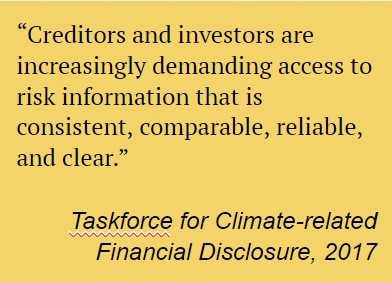Briefing note
ACCR questions for Ernst and Young as the auditor of the Woodside Petroleum Limited’s 2021 financial statements
As Woodside Petroleum Limited’s (ASX:WPL) auditor, Ernst and Young has a duty to ensure WPL’s financial statements are true and fair. Climate risk is financial risk. Financial risk should be reflected in true and fair financial statements.
The Taskforce for Climate-related Financial Disclosure recognises this and has been recommending that climate disclosures are integrated into financial statements since 2017. This has resulted in more detailed climate disclosures, but they still often lack substance and are separate to the financial statements.
The Climate Action 100+ Net Zero Company Benchmark has recently established a Climate Accounting and Audit indicator. The most carbon intensive listed companies were assessed against the following criteria[1] for the first time in March 2022:
- The audited financial statements and notes thereto incorporate material climate-related matters. This includes a review for consistency between the financial statements and the company’s other reporting.
- The audit report demonstrates that the auditor considered the effects of material climate-related matters in its audit. This includes a requirement that the audit report disclose how the assessment was undertaken and any identified inconsistencies between the financial statements and ‘other information’.
- Whether the audited financial statements incorporate the material impacts of the global drive to net-zero greenhouse gas emissions to 2050 (or sooner).
The Climate Action 100+ assessment concluded that WPL’s 2020 financial statements and audit report (issued in 2021) do not meet any of the above criteria[2].
Based on ACCR’s review of WPL’s 2021 financial statements, audit report and climate disclosures, we have drafted the below questions for Ernst and Young to address at WPL’s AGM on Thursday, 19 May 2022. This has been done in line with s250PA of the Corporations Act (2001).
We invite shareholders to review these questions and carefully consider the responses provided by Ernst and Young at WPL’s 2022 Annual General Meeting.
Questions for Ernst and Young (EY) as the auditor of Woodside Petroleum Limited’s 2021 financial statements
We note the Taskforce for Climate-related Financial Disclosure (TCFD) recommends organisations provide climate-related financial disclosures in their mainstream (ie public) annual financial filings. However, Woodside chose to provide this information in its separate Climate Report 2021.
Despite this separation of highly interdependent information, we gained comfort in reading the 2021 Audit Report that EY has a responsibility to read this ‘other information’ and, in doing so, consider whether the other information is materially inconsistent with the financial report, or its knowledge obtained in the audit.
We appreciate that determination of the effects of climate change on an entity’s financial statements may require significant effort and judgement, and we anticipated the Annual Report 2021 would provide robust disclosures on the most significant assumptions, estimates and judgements made related to climate change.

Yet, upon review of the Annual Report 2021, we were disappointed by the lack of transparency relating to the most significant assumptions, estimates and judgements made. Where these assumptions have been disclosed, they do not appear to align with the objectives of the Paris Agreement, which enshrines a target to limit global warming to well below 2°C, and to make efforts to limit warming to 1.5°C.
To perform our own reconciliation of the two reports, and to understand whether any material inconsistencies exist between the two reports, we have prepared questions for EY, which are provided in Attachment A.
Attachment A: Australasian Centre for Corporate Responsibility questions for Ernst and Young (EY) as the auditor of Woodside Petroleum Limited’s 2021 financial statements
1. Sensitivity testing using a low carbon scenario
A future that meets the objectives of the Paris Agreement (either a well below 2°C or a 1.5°C future) would present significant transition risks for Woodside and materially impact its financial position.
Question (a) for EY: Did EY undertake any sensitivity testing using a 2°C or 1.5°C scenario (such as the IEA’s Net Zero Emissions scenario)? If so:
- Why were the results of this scenario(s) modelling not disclosed in the financial statements or mentioned in your audit report?
- Relative to the base case, how did Woodside’s credit rating(s), access to debt and cost of debt vary under this scenario(s)?
If you didn’t complete this sensitivity testing, please explain why.
2. EY’s consideration of changing climate policy in Australia
We acknowledge that carbon cost pricing has been explained in Note B.4: ‘US$80/tonne of emissions (real terms 2022) […] is applicable to Australian emissions that exceed facility-specific baselines in accordance with Australian regulations, as well as global emissions that exceed voluntary corporate net emissions targets.

Question (b) for EY: Noting that all of Woodside’s revenues are derived from fossil fuel producing assets in Australia, did you assure the impact of potential changes to Australia’s climate policy, such as changes that would make all of Woodside emissions subject to a carbon price?
3. EY’s consideration of the impairment reversal of the Pluto CGU
In the sell down of 49% of Pluto 2 to Global Infrastructure Partners (GIP), Woodside retained additional risk, relative to a typical joint venture arrangement, specifically relating to construction schedule, construction cost, regulatory approvals and a portion of ongoing carbon pricing risk.

Question (c) for EY: What impact did Woodside’s atypical risk profile have on the discount rate, cash flows, valuation and/or impairment reversal for the Pluto CGU? How was this assured by EY? If this was not assured, why not?
4. Treatment of climate change as a Key Audit Matter.
The TCFD recommends that corporate disclosures should be comparable across industries. The treatment of climate change in the audit of the financial statements of Woodside’s peers and joint venture partners is not however consistent. For example, the audit of Shell’s latest financial statements conducted by EY, provided an expansive description of the testing undertaken to assure the treatment of climate change in Shell’s financial statements. It was the first Key Audit Matter.

Question (d) for EY: Why is climate change not included as a Key Audit Matter? What procedures have you conducted to assess the risk of climate change to Woodside?
Alex Hillman, Carbon Analyst
Australasian Centre for Corporate Responsibility